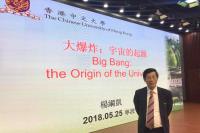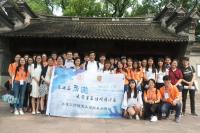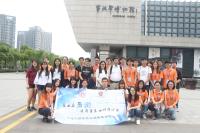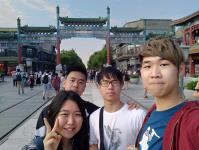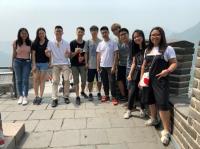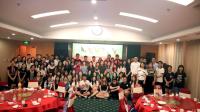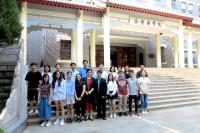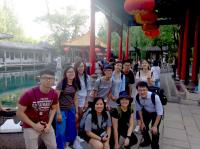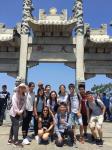Ningbo Hong Kong Summer Exposure Programme 2018
The seven-day Ningbo Hong Kong Summer Exposure Programme 2018 was co-organised by the College, the Office of Academic Links (China) and Ningbo University. A group of twelve College students and one from Chung Chi College visited Ningbo University between 23 and 29 May 2018. The College appointed two College students, KO Wai Lok Zac (Year 1) and LEE Tsz Ching Percy (Year 2), as group leaders. Prof Kenneth YOUNG and Prof WONG Suk Ying, Warden of the College Hostel, joined a few days of the trip with the students.
Prof Kenneth YOUNG, appointed 'Li Dak Sum Professor' by Ningbo University, gave a talk on 'Big Bang: the Origin of the Universe' on 25 May 2018, attracting an audience of about 400, including teachers and students from Ningbo University and the general public. Meanwhile, Ningbo University invited their Professors JIN Lu and YU Haihong to deliver talks on 27 May on the topics 'Invention of Mahjong' and 'The Belt and Road Initiative of Port of Ningbo–Zhoushan' respectively. Students learned about the origin and history of mahjong and its social impacts; they also had a glimpse into the economic development of Port of Ningbo–Zhoushan and its contribution to economic trade and logistics in China.
The tour programmes were diversified and covered cityscape, cultural and historic landmarks and natural scenery. Participants visited places like the former residence of Chiang Kai-shek and Xuedoushan Scenic Resort (雪竇山), famous for its natural beauty, at Fenghua, Xikou Town, as well as the Ningbo Museum. Prof WONG Suk Ying accompanied students to visit the Tianyige Museum, the oldest private library in China, with a collection of Qing Imperial gifts. Interestingly there were also exhibits about the origin of mahjong. In one of the evenings, students spent some leisure time at the shops and restaurants in Nantang Old Street and along the riverside. Students could explore the differences in lifestyle between Ningbo and Hong Kong people.
To learn about the history of Zhoushan and its role in the Opium War, students joined a visit to the Opium War Ruins Park, and saw the Zhoushan Opium War Memorial. In the park, the graves of some Chinese troops who died in the war have been restored. The three Chinese commanders who gave their lives in the fight are commemorated in a memorial hall nearby.
Students also visited Mount Putuo (普陀山), an island in Zhoushan Prefecture of Zhejiang Province, China, renowned as one of the four sacred mountains in Chinese Buddhism. Mount Putuo lies in the East China Sea and presents the beauty of both mountain and sea. It is dedicated to Guanyin (觀音), the Goddess of Mercy, and there are numerous famous Guanyin temples in the mountain.
Ningbo University also took the students to Hangzhou Bay Marsh (杭州灣國家級濕地公園), a wetland park and a perfect place for bird-watching.
All in all, during this summer exposure programme, the participants could explore the similarities and differences between Ningbo and Hong Kong, and visit many historic and cultural heritage sites. The trip of experiential learning broadened the students' horizons; contributed to their personal growth, and fostered friendship among students of the two universities. The College is deeply grateful to the students and teachers of Ningbo University for their enthusiastic hospitality. The College also thanks Li Dak Sum International Exchange Fund for its sponsorship of the trip.
Cultural and Language Study Tour to Beijing
The 15-day Cultural and Language Study Tour to Beijing was organised by the College, in collaboration with the Office of Academic Links (China) of CUHK and the Beijing Language and Culture University (BLCU). A group of four College students visited Beijing on this study tour between 10 and 24 June 2018.
Hosted by BLCU, the tour was designed as a combination of Putonghua study, Putonghua Shuiping Ceshi (PSC for short), the official test of oral proficiency in Standard Chinese designed for native speakers of Chinese, and cultural exchange. The Putonghua lessons, rich in content and with an accent on practicality, were conducted by highly qualified teachers, who encouraged class interaction through interesting discussions. Our students also made friends with peers from The Open University of Hong Kong and The Education University of Hong Kong, who were in the same Putonghua class.
Before the end of the course, the participants had a valuable opportunity to take the PSC, which is recognised and regarded as authoritative throughout China including Hong Kong. Students will find the recognition useful when they enter the workplace.
The tour programmes were diversified, ranging from sightseeing, Putonghua learning to cultural exploration. Students attended a Peking opera class and watched a performance at Liyuan Theatre. Despite original apprehension that Peking opera might be dull for young people, the students found the performance thrilling and fun, with lavish costumes and captivating acting.
The itinerary of the tour included sightseeing to historically and culturally significant spots. The participants were impressed with the wisdom of traditional Chinese architecture through visits to the Palace Museum, the Mutianyu Great Wall, the Summer Palace and the Prince Gong Mansion, to name only a few. The students also visited some modern buildings in Beijing, such as the Beijing National Stadium, the Beijing National Aquatics Center, and the Beijing 798 Art Zone. To enjoy the natural scenery in the rural areas and the relaxing lifestyle there, the students flew kites made by themselves.
Overall, the journey was educational and eye-opening. The participants improved their Putonghua speaking skills, and also gained a better understanding of both the traditional and modern sides of China. The students felt thankful to BLCU for its hospitality and the fond memories.
Cultural Tour to Shandong University Cheeloo College of Medicine
The five-day Cultural Tour to Shandong University Cheeloo College of Medicine was co-organised by CW Chu College, Lee Woo Sing College and Shandong University between 11 and 15 June 2018. A group of three CW Chu College students and four students from Lee Woo Sing College joined this study tour.
For academic exchange, students had a valuable chance to visit Qilu Hospital of Shandong University with students from Cheeloo College of Medicine, Shandong University. (For historical reasons going back to the 19th century, the College of Medicine adopts the name 'Cheeloo', while the hospital uses modern pinyin 'Qilu'; both refer to the same Chinese characters.) Qilu Hospital of Shandong University is a major general teaching hospital and tertiary referral centre, with comprehensive roles in medical service, teaching and research. Through the visit to different medical facilities in the hospital and auditing some of the classes, students learnt more about the hospital and the latest development of medical science and technology.
For cultural and historical exposure, participants visited the Shandong Museum. Founded in 1954, the museum was the first provincial-level museum agency that was set up after the establishment of the People's Republic. Since 1954 it has assumed responsibility for conservation of cultural relics both subterranean and above ground, in the area of Shandong; conducted field surveys and carried out a series of archaeological excavations. The exhibits showcased the history of the Shandong area from the Neolithic age to modern times.
Students also had a tour to Qufu, the ancestral town of Confucius. The tranquil town boasts a rich history and culture. There is the famous UNESCO World Heritage Site dedicated to the trio of memorials to Confucianism (San Kong, 三孔): the Temple of Confucius (孔廟), the Cemetery of Confucius (孔林) and the Kong Family Mansion (孔府).
Apart from its history, Jinan in Shandong is famous for its natural environment, especially springs. Shandong University has therefore arranged for students a sightseeing activity to Baotu Spring and Daming Lake. Students were mesmerised by the picturesque view of Baotu Spring featuring ancient-styled buildings with colorful carvings. Daming Lake is the largest lake in Jinan and one of city's main natural, cultural and historic landmarks. Students had the opportunity to take a relaxing and refreshing boat ride on the lake. They deeply appreciated the beautiful natural landscape.
The itinerary also included a visit to Mount Taishan Global Geopark, which boasts breathtaking scenery, and abundant geological heritage and resources. It was recognised as a World Cultural and Natural Heritage Site by UNESCO in 1987. Students learned about the importance of protecting the geopark for esthetic, natural, and scientific values.
The Cultural Tour to Shandong was an excellent way for students to explore and learn more about the historical, cultural, scientific and medical development in Jinan, as well as to appreciate the natural beauty of Shandong.



















